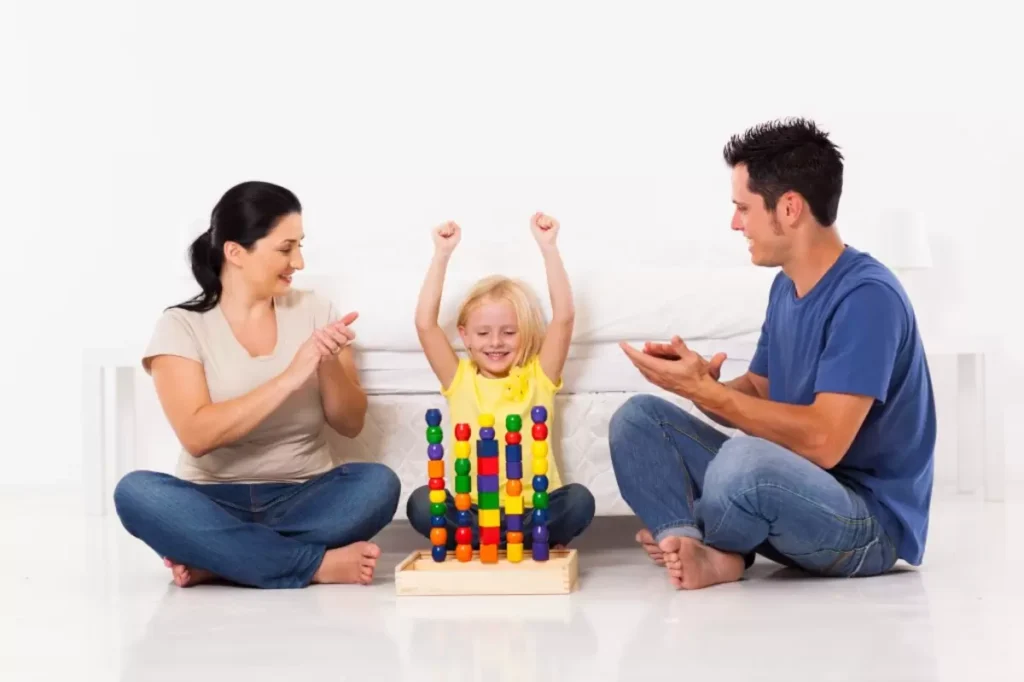How can parents support positive personality development in children?
Assisting Your infant’s tremendous personality development
As parents, one of our most essential roles is assisting youngsters establish a robust foundation for growth into impartial, well-adjusted adults. A great issue in how someone’s individual bureaucracy is the development of critical tendencies like emotional intelligence, self assurance, duty, and independence all through adolescence. By fostering those characteristics from a young age, caregivers can positively form their children’s personalities.
in this in-depth article, we can explore specific strategies parents can use to inspire positive persona improvement in children. we will continue cultivating emotional capabilities, building self-esteem, and promoting independence through age- -suitable obligations. The aim is to equip each younger one and their guardians with equipment to assist all-around premier persona boom.
The significance of Emotional Intelligence in kid’s nice personality improvement
Emotional intelligence refers back to the capability to recognize, use, and manipulate feelings in productive methods. It encompasses skills like as it should be perceiving emotions, regulating responses to emotions, and managing relationships empathetically. developing emotional IQ is crucial for navigating existence’s many challenges with resiliency. sizeable studies have shown that better emotional intelligence in children connects to better intellectual health, instructional success, and social competence as they mature into adulthood.
kid’s personalities and the way they have interaction with the arena are powerfully formed via emotional abilities installed early on. Caregivers consequently play an instrumental role in cultivating this critical vicinity of intelligence from a young age to set kids up for fulfillment. dad and mom who foster emotional competencies assist guide high-quality persona improvement.

Modeling and Discussing Emotions Promotes Emotional Intelligence
one of the most impactful matters dad and mom can do is deal with emotions in a positive, regulated manner. When strong feelings arise, take deep breaths and verbalize how you plan to respond helpfully. Say things like “I’m feeling frustrated right now but I’m going to walk away until I calm down instead of yelling.” This demonstrates emotional self-awareness and control.
It is also important that discussions about feelings are a regular occurrence in family life. Whether reading stories together or during everyday interactions, point out how characters might feel in different situations. Encourage children to share and name their own emotions without judgment. Ask open-ended questions that explore underlying reasons for feelings and perspectives of others.
Daily guided practice identifying, understanding, and appropriately expressing and managing a range of emotions is key for developing this ability. By promoting regular emotional reflection and conversation, caregivers can significantly boost kids’ emotional intelligence foundation early on.
Role Playing Scenarios Bolsters Empathy Skills
One unique method for cultivating emotional intelligence in children is role playing scenarios where someone feels sad, upset, angry or confused. Have kids guess how the person might feel from their point of view, then discuss potential ways to help or resolve the issue empathetically.
When your own child becomes distressed, prompt them to imagine how others in similar situations may feel before intervening or guiding behavior correction. This builds valuable perspective taking ability. Role playing is an entertaining, engaging way to strengthen empathy which supports positive personality development.
Building on a Strong Emotional Base
The emotional skills gained during childhood form the groundwork kids rely on for navigating social complexities and challenges throughout their lives. Children who establish emotional intelligence early on due to parents fostering understanding, regulation and empathy tend to enjoy greater well-being, relationships and achievements moving forward. Make cultivating emotional skills a top priority through modeling, practicing identification and problem-solving to set your child up for optimal growth.
Boosting Self-Esteem is Key for Positive Personality Development
Another core aspect of forming a healthy, well-adjusted personality is developing robust self-esteem, or one’s overall self-worth and belief in their own capabilities and value. Research clearly shows self-esteem profoundly affects life outcomes including mental health, success, relationships and perseverance when facing adversity. [4,5] Nurturing children’s positive sense of self is thus extremely important work for parents.
Focusing on Effort Reinforces Self-Esteem
Instead of only praising results or achievements, make it a habit to recognize attempts and effort exerted. Note how hard kids tried at a task regardless of the outcome, saying things like “I’m so proud of your persistence in practicing that dance routine every day.” Shift attention to factors within their control rather than variables like luck, other’s actions or natural abilities.
Celebrating effort cultivates self-esteem by validating the process of learning and improving versus final performances alone. It teaches children that self-worth stems from dedication to growth rather than just outcomes or accomplishments. Parents who emphasize valuing effort over exclusively rewarding end results foster durable confidence within kids.
Independent Play is Crucial for Self-Assurance
Unstructured solo or social play in safe environments without hovering guidance allows full expression and exploration. It builds competence through independent problem solving and mastering new skills. Self-directed experiences are proven to support resilience and boost natural confidence by letting children succeed or fail without judgment on their own terms.
While ensuring safety, parents should resist over-managing play and give space and time for relaxed independent imagination. Standby observation from a distance to build self-belief from freely practicing interests and hobbies without constant feedback. Independent play driven by intrinsic motivation is essential for forming robust self-esteem supporting optimal personality growth.
Internalizing Positive Self-Views
The self-perceptions children develop greatly influence resulting traits, decisions and life paths. Research shows kids internalize reflected appraisals from parents, teachers and peers. Caregivers have the power to shape how their children view themselves through words of encouragement focusing on efforts versus criticism of mistakes or shortcomings alone.
Concentrating praise on dedication, persistence and improvement attempts aids formation of durable positive self-beliefs children carry into adulthood. Parents who support exploration and celebrate kids for simply being themselves as they grow cultivate self-esteem foundational for personality flourishing.
Fostering Responsibility Strengthens Independence in Personality Development
Another important factor supporting in positive personality development in children, balanced personalities is encouraging independence appropriate for different developmental stages. As children mature, assigning age-specific household responsibilities and duties helps build life skills, discipline, self-sufficiency and accountability critical for the future. It also provides structure contributing to stability and wellbeing.
Research indicates that involvement in modest chores matching abilities connects to greater responsibility and cooperation. Jobs should carry natural consequences, and rewards systems avoided in favor of expressing gratitude. Assigning age-appropriate accountability supports independence which bolsters personality growth.
Implementing Simple Daily/Weekly Chores
Even toddlers can assist by picking up toys with a song, setting the table or watering plants under supervision. As kids grow, chores may include dusting, vacuuming, meal prep tasks, laundry sorting. Appropriate responsibilities boost competence and self-worth from contributing.
Allowing Problems to be Solved Naturally
When conflicts or accidents occur, taking a step back rather than swooping in with fixes models problem-solving skills. Ask open-question prompts like “What happened here?” and “How can we make it better?” to encourage critical thinking. Natural results aid invaluable life lessons while preserving dignity from figuring it out alone.
Involving Kids in Planning
Discuss family events and have children brainstorm age-appropriate roles such as setting up, snack-making or entertainment. Giving tangible tasks to look forward to and responsibilities fosters independence along with feeling interdependent and invested in family life. Independence is cultivated from competence gradually built through structure provided by caregivers.

FAQs -How can parents support positive personality development in children?
Q: What is the role of parents for positive personality development in children ?
A: Providing them with the attention they seek will make them believe that we will be with them for their all needs and will stay with them till the end no matter what happens. This thought can help them to think positively. Put effort into their needs and be with them, letting them know that you are at their reach.
Q: How can parents support positive personality development in children?
A: Positive parenting is about showing children love, warmth and kindness. It’s about guiding children to act the way you want by encouraging and teaching them. It’s about helping children thrive by sending the powerful message: You are loved, you are good, you matter.
Q: What methods can support positive personality development in children ?
A: The best method to support positive personality development in children is not by immediately correcting every minor mistake, nor by comparing to another child’s behavior, but by using positive language. Positive language acknowledges good behavior, encourages self-esteem, and reinforces the desired actions.6
Conclusion –How can parents support positive personality development in children?
Supporting children’s emotional skills, self-esteem and independence through reasonable responsibilities establishes the foundation for healthy, well-adjusted personalities to blossom. Parents play an instrumental role in each child’s positive development by nurturing communication, emotional regulation, empowerment and accountability matching their growing capabilities. Our guidance during these formative years profoundly shapes kids into confident individuals set up for thriving journeys ahead. Fostering traits like competence, resilience and self-assurance should be a priority for any caregiver interested in children’s optimal growth.
There are several powerful approaches that address How can parents support positive personality development in children? and how dad and mom can guide high quality persona development of their youngsters. setting up warm, nurturing relationships thru unconditional love and attractiveness is crucial for wholesome increase. when children feel sincerely visible, heard and valued for who they’re, it permits their herbal interest, creativity and desire to discover ways to flourish. growing empathy and perspective taking capabilities early on additionally performs a huge role. Exposing youngsters to exclusive cultures, ideals and stories enables them apprehend there are numerous valid methods to view the world. This cultivates tolerance and appreciate for others.
How can parents support positive personality development in children ensures by high quality personality improvement stems from meeting children’s fundamental human wishes. A solid domestic surroundings with unconditional love, empathy, autonomy aid, cognitive stimulation, social interactions and emotional law fosters increase throughout all domains. dad and mom play a pivotal function because the first role fashions. through cultivating warm, caring relationships and offering developmentally-appropriate possibilities for exploration, obligation and courting-constructing, they could profoundly form kids into psychologically wholesome, resilient and compassionate individuals. Their sustained involvement thru engagement, validation of emotions and steerage in conflicts equips kids with lifelong coping talents to navigate challenges independently.







